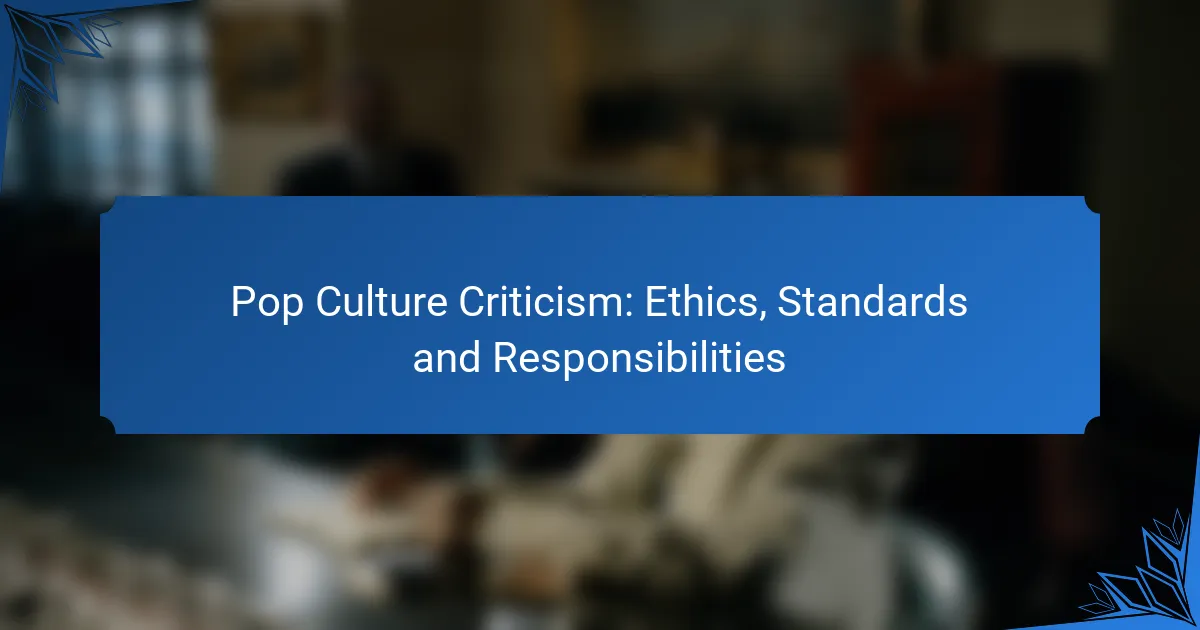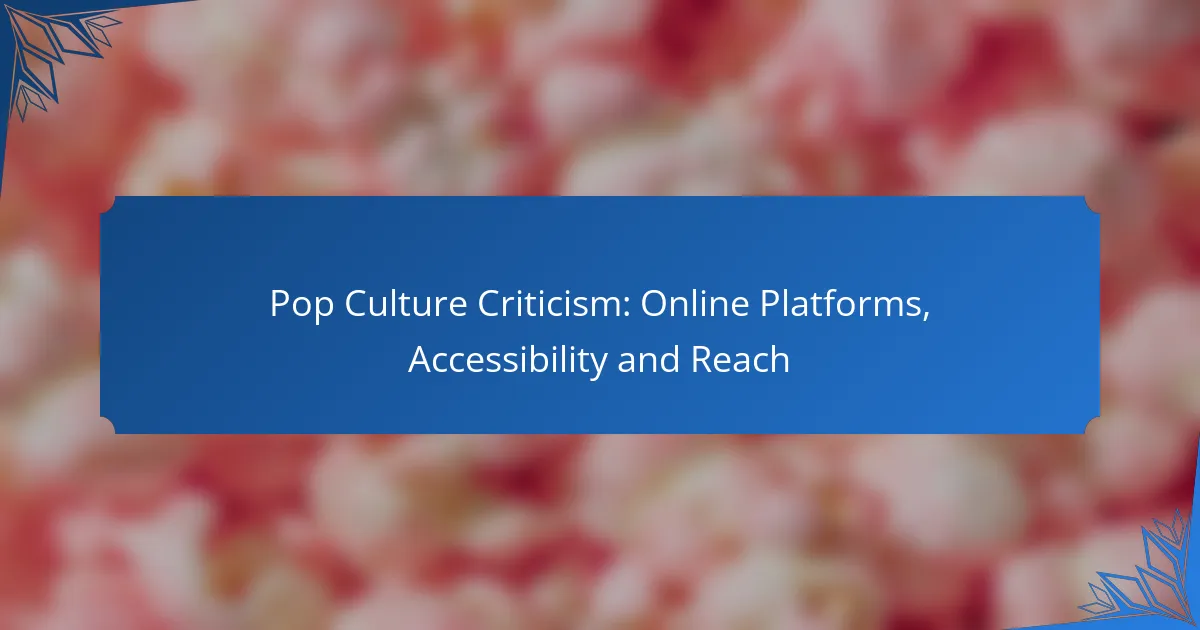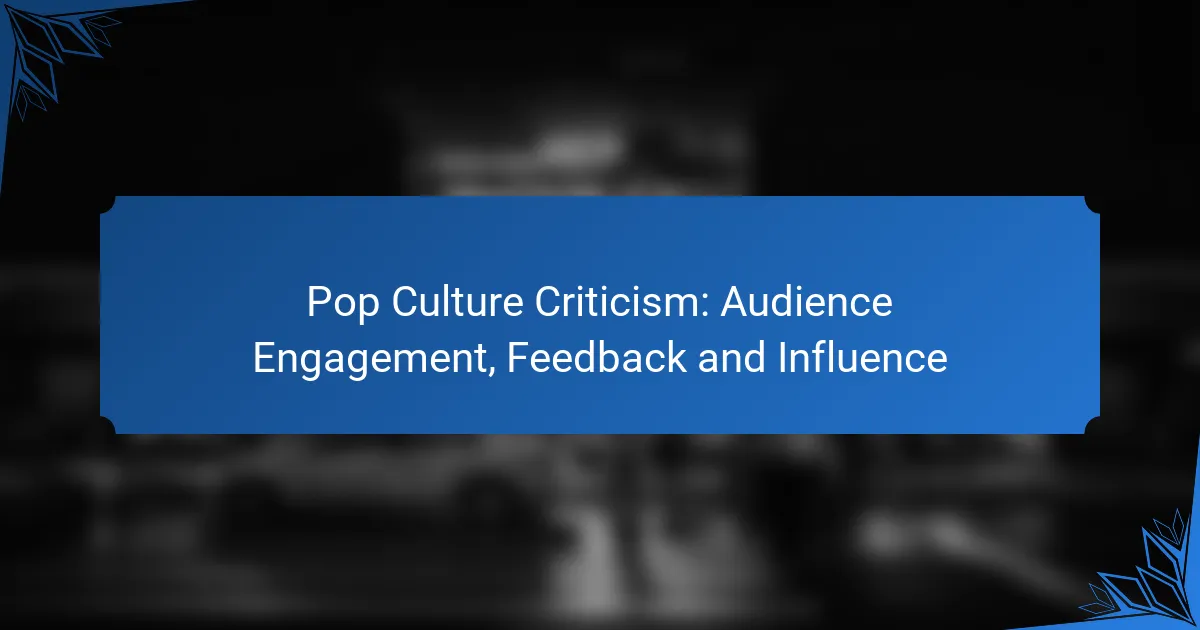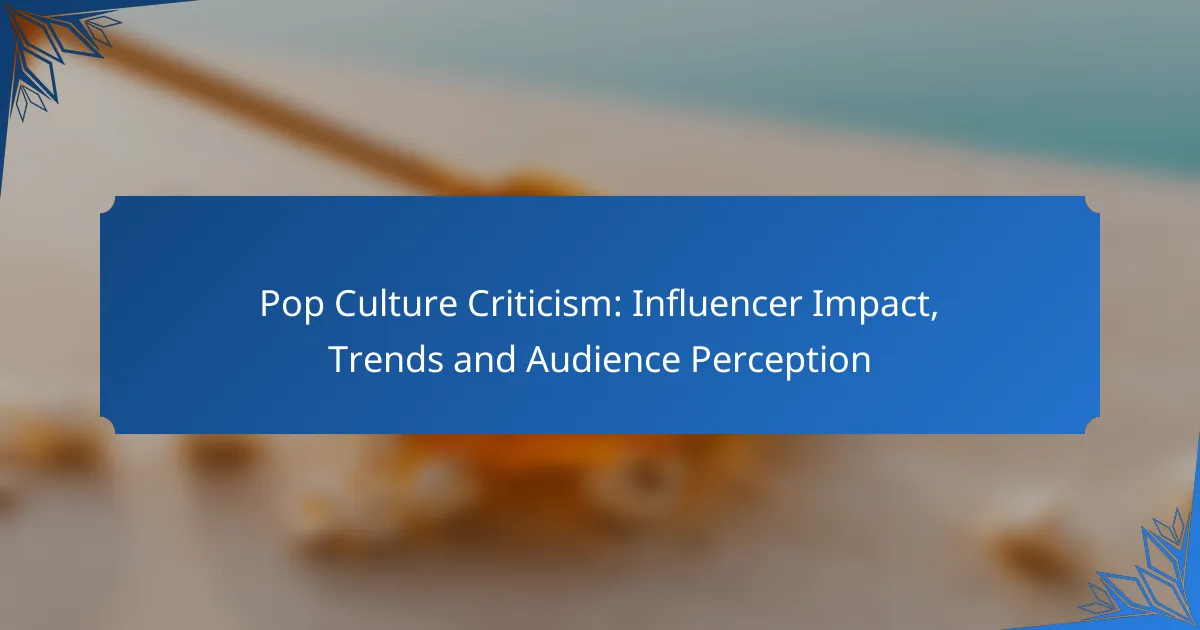Pop culture criticism plays a vital role in shaping public discourse, and it is essential for critics to adhere to ethical standards that promote transparency, accountability, and respect for creators. By prioritizing accuracy and inclusivity, critics can provide informed evaluations that foster responsible dialogue within the cultural landscape. Navigating the complexities of representation and bias, ethical criticism ensures that diverse perspectives are respected and valued in the conversation.
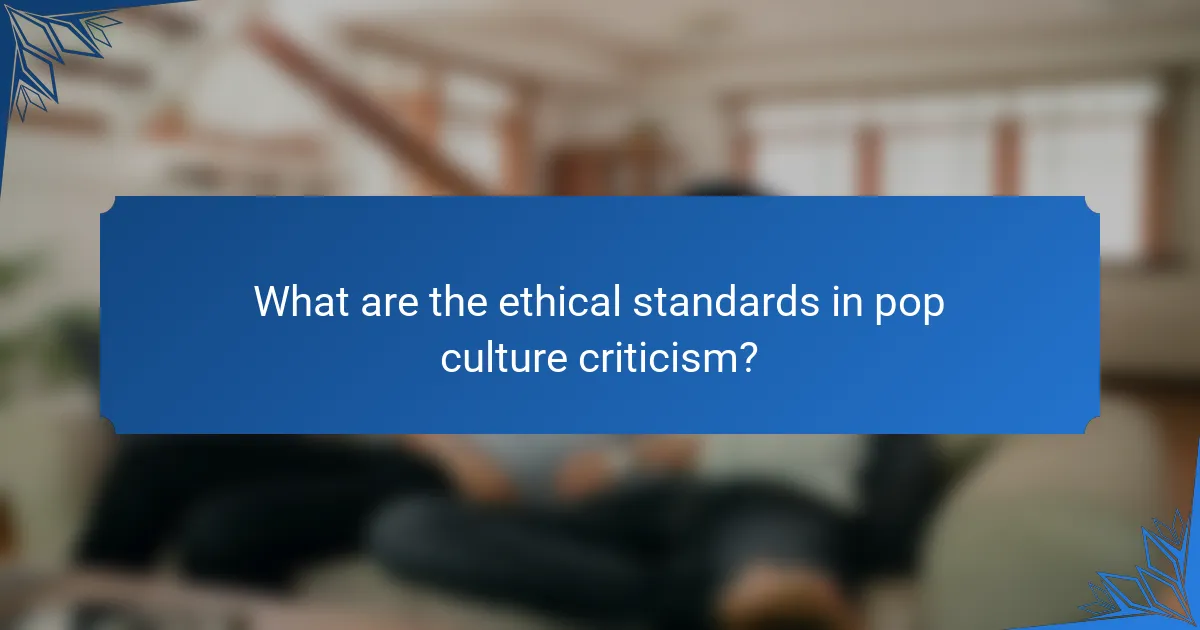
What are the ethical standards in pop culture criticism?
Ethical standards in pop culture criticism involve transparency, accountability, respect for creators, and inclusivity. These principles guide critics in providing fair and informed evaluations while fostering a responsible dialogue within the cultural landscape.
Transparency in sources
Transparency in sources means that critics should clearly disclose where their information comes from, including any potential biases. This practice helps audiences understand the context of the criticism and the reliability of the opinions presented.
For example, if a critic references a study or a specific piece of media, they should provide citations or links to those sources. This allows readers to verify claims and assess the credibility of the critique.
Accountability for opinions
Critics must take responsibility for their opinions, ensuring they are based on sound reasoning and evidence. This accountability fosters trust between critics and their audience, encouraging thoughtful discussions about the media being reviewed.
To maintain accountability, critics should be open to feedback and willing to engage in discussions about their viewpoints. Acknowledging mistakes or changing perspectives over time can enhance credibility and demonstrate growth.
Respect for creators
Respect for creators involves recognizing the effort and intention behind artistic works. Critics should approach their evaluations with an understanding of the creative process, avoiding personal attacks or dismissive language.
For instance, when critiquing a film, a critic might focus on the themes and execution rather than making derogatory comments about the filmmakers. This respectful approach encourages a more constructive dialogue about the work.
Inclusivity in perspectives
Inclusivity in perspectives means considering diverse viewpoints and experiences when critiquing pop culture. This approach enriches the conversation and ensures that underrepresented voices are heard and valued.
Critics can achieve inclusivity by actively seeking out and amplifying perspectives from various demographics, including different races, genders, and socioeconomic backgrounds. This practice not only broadens the scope of criticism but also fosters a more equitable cultural discourse.
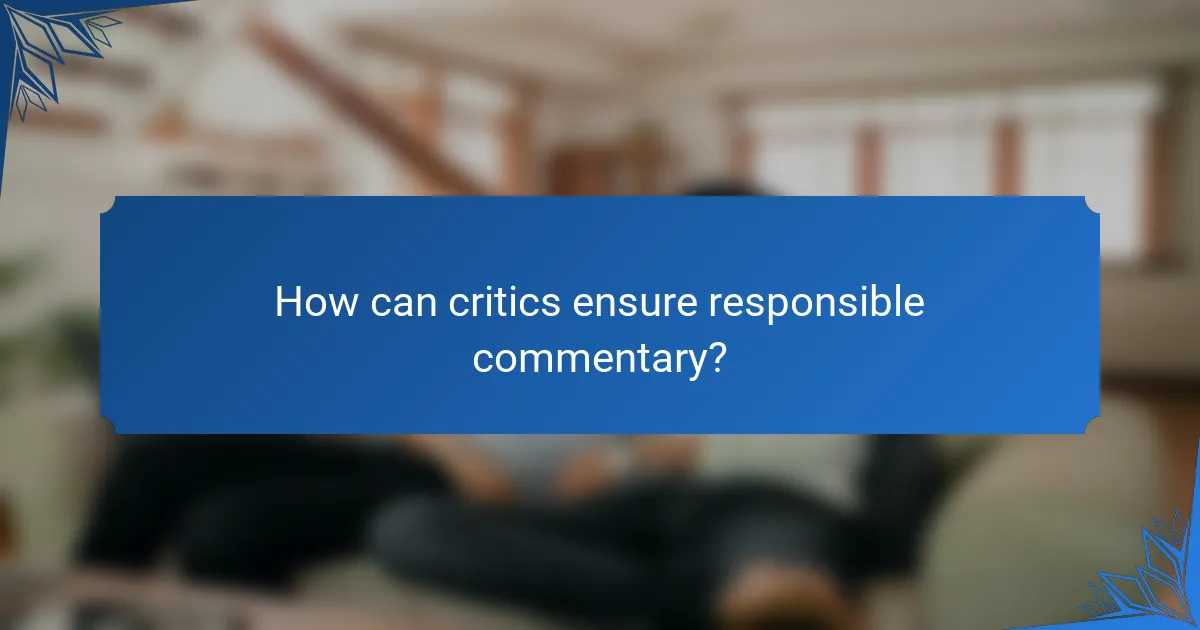
How can critics ensure responsible commentary?
Critics can ensure responsible commentary by adhering to ethical standards, prioritizing accuracy, and being mindful of their influence. This involves thorough research, self-awareness, and a commitment to inclusivity in their analyses.
Fact-checking before publication
Fact-checking is essential for maintaining credibility in criticism. Critics should verify all claims, statistics, and references before publication to avoid spreading misinformation. This can involve cross-referencing multiple reputable sources and consulting experts when necessary.
Utilizing fact-checking tools and platforms can streamline this process. Critics should allocate sufficient time for this step, ideally several days before the publication deadline, to ensure thoroughness.
Avoiding personal bias
To provide fair commentary, critics must recognize and mitigate their personal biases. This involves reflecting on their own perspectives and how these may color their interpretations of the subject matter. Critics should strive for objectivity by focusing on the work itself rather than personal preferences.
Engaging in peer reviews or seeking feedback from colleagues can help identify potential biases. Critics should also consider presenting multiple viewpoints to provide a balanced analysis.
Engaging with diverse voices
Incorporating diverse voices enriches criticism and broadens perspectives. Critics should actively seek out and include opinions from individuals with different backgrounds, experiences, and viewpoints. This can lead to a more comprehensive understanding of the subject being critiqued.
Critics can engage with diverse voices through interviews, collaborations, or by referencing works from underrepresented creators. This practice not only enhances the quality of commentary but also fosters a more inclusive cultural dialogue.
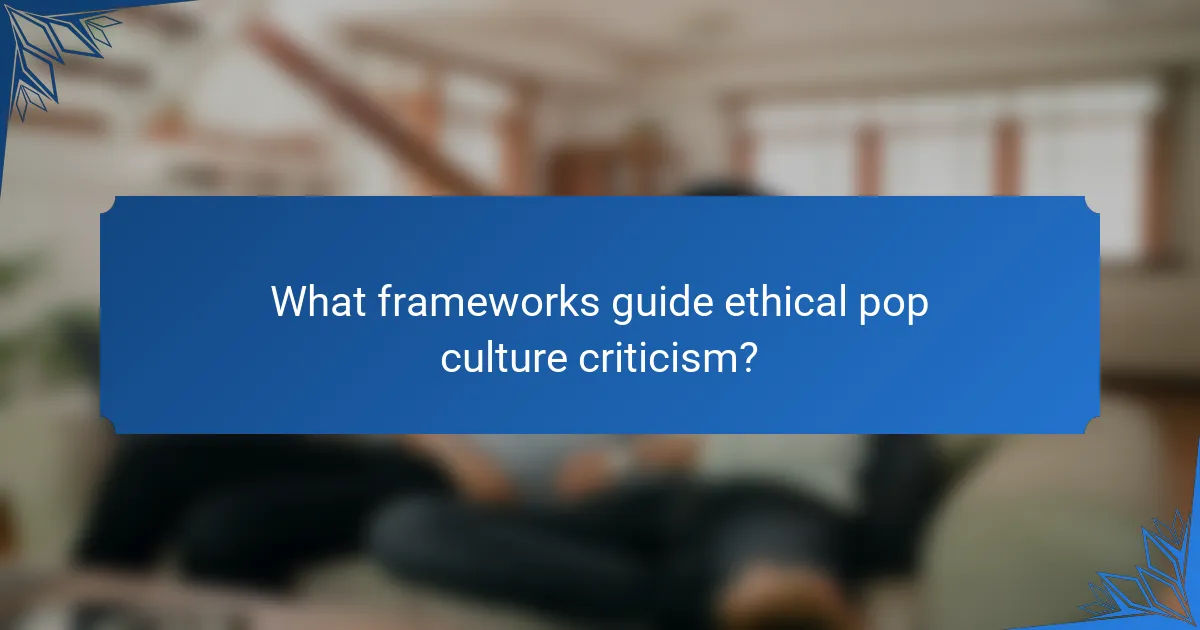
What frameworks guide ethical pop culture criticism?
Ethical pop culture criticism is guided by frameworks that prioritize integrity, accountability, and respect for diverse perspectives. These frameworks help critics navigate the complexities of representation, bias, and the impact of their commentary on audiences and creators alike.
Industry codes of conduct
Industry codes of conduct serve as essential guidelines for pop culture critics, outlining expected behaviors and ethical standards. These codes often emphasize honesty, transparency, and respect for intellectual property, ensuring that critics operate within a framework that promotes fairness and integrity.
For example, organizations like the Online News Association provide codes that encourage journalists and critics to disclose conflicts of interest and avoid plagiarism. Adhering to these codes not only enhances credibility but also fosters trust with audiences.
Peer review processes
Peer review processes are critical in maintaining the quality and ethical standards of pop culture criticism. This process involves having other experts evaluate a critic’s work before publication, ensuring that the analysis is sound, well-researched, and free from bias.
Critics should seek feedback from peers who can provide constructive criticism and highlight potential ethical concerns. Engaging in peer review can help identify blind spots and improve the overall quality of the critique, ultimately benefiting both the critic and the audience.
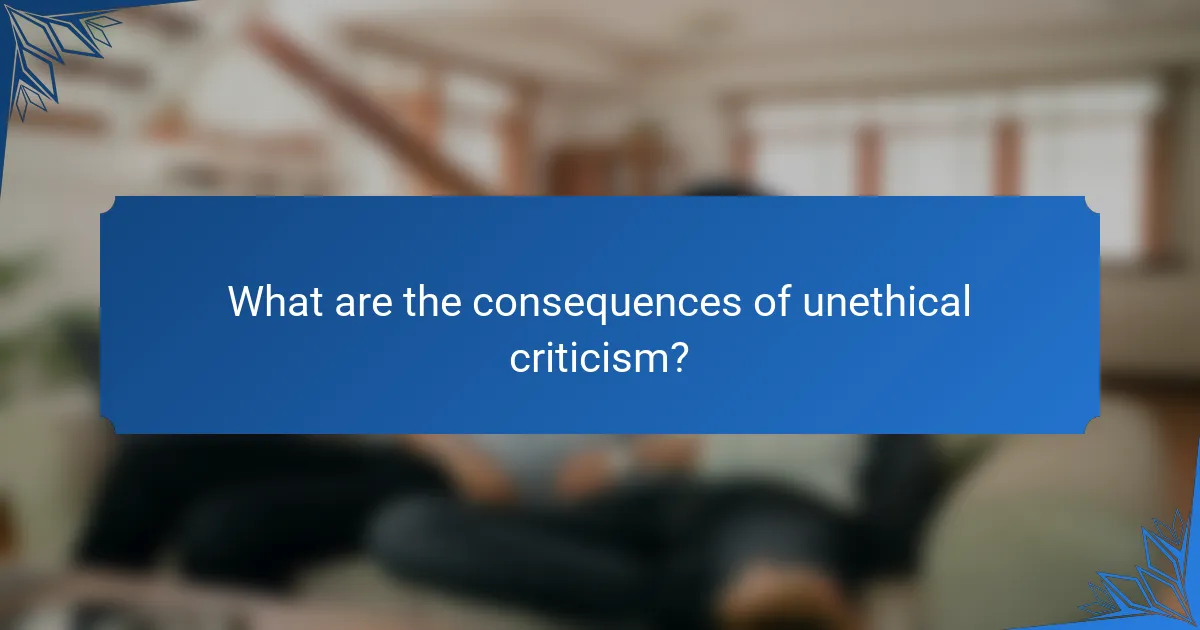
What are the consequences of unethical criticism?
Unethical criticism can lead to significant negative outcomes, including harm to individuals’ reputations, erosion of audience trust, and potential legal issues. These consequences not only affect the criticized parties but also the critics and the broader media landscape.
Damage to reputations
Unethical criticism can severely damage the reputations of individuals or organizations. When critics spread false information or engage in personal attacks, the targeted parties may suffer long-term harm to their public image and professional relationships.
For example, a critic who inaccurately portrays a filmmaker’s work may lead to a decline in the filmmaker’s future opportunities. This reputational damage can take years to repair, affecting not just the individual but also their collaborators and stakeholders.
Loss of audience trust
When critics engage in unethical practices, they risk losing the trust of their audience. Readers and viewers expect honesty and integrity in criticism; when these standards are compromised, audiences may turn away from the critic’s work.
For instance, if a popular critic is found to have biased motives or conflicts of interest, their followers may question the validity of their reviews. This loss of trust can lead to a significant decrease in readership or viewership, impacting the critic’s career and influence.
Legal repercussions
Unethical criticism can also lead to legal consequences, particularly when it involves defamation or slander. Critics must be cautious about the claims they make, as false statements can result in lawsuits and financial penalties.
In many jurisdictions, individuals have the right to protect their reputation from false statements. Critics should ensure their reviews are grounded in fact and avoid personal attacks to mitigate the risk of legal action. Consulting legal guidelines on defamation can provide clarity on what constitutes acceptable criticism.
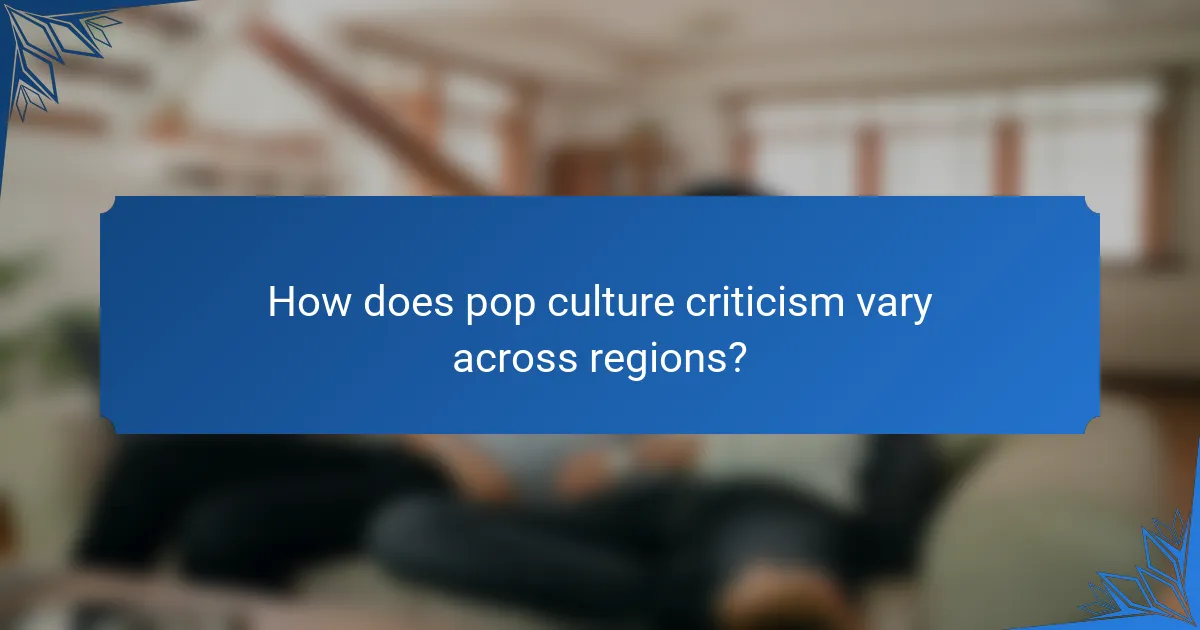
How does pop culture criticism vary across regions?
Pop culture criticism varies significantly across regions due to differing cultural norms, values, and media landscapes. These variations influence how critics approach topics, the sensitivity of content, and the regulatory frameworks that govern media expression.
Differences in cultural sensitivities
Cultural sensitivities play a crucial role in shaping pop culture criticism. In some regions, topics like gender representation or political satire may be scrutinized heavily, while in others, they might be embraced more openly. For instance, criticism of celebrity culture may be viewed as acceptable in Western countries but could be seen as disrespectful in more collectivist societies.
Critics must be aware of local taboos and values, as what is considered humorous or insightful in one culture may be offensive in another. This awareness can guide critics in framing their arguments and choosing their language carefully to avoid backlash.
Regional media regulations
Media regulations significantly impact how pop culture criticism is conducted. In some countries, strict laws govern freedom of expression, requiring critics to navigate complex legal landscapes. For example, in nations with stringent censorship laws, critics may face penalties for discussing certain topics, leading to self-censorship or the use of euphemisms.
Understanding local regulations is essential for critics to avoid legal repercussions. In regions with more liberal media laws, critics may have greater freedom to express controversial opinions, but they still face the challenge of public backlash or social media scrutiny. Critics should stay informed about the regulatory environment to ensure their work remains compliant and relevant.
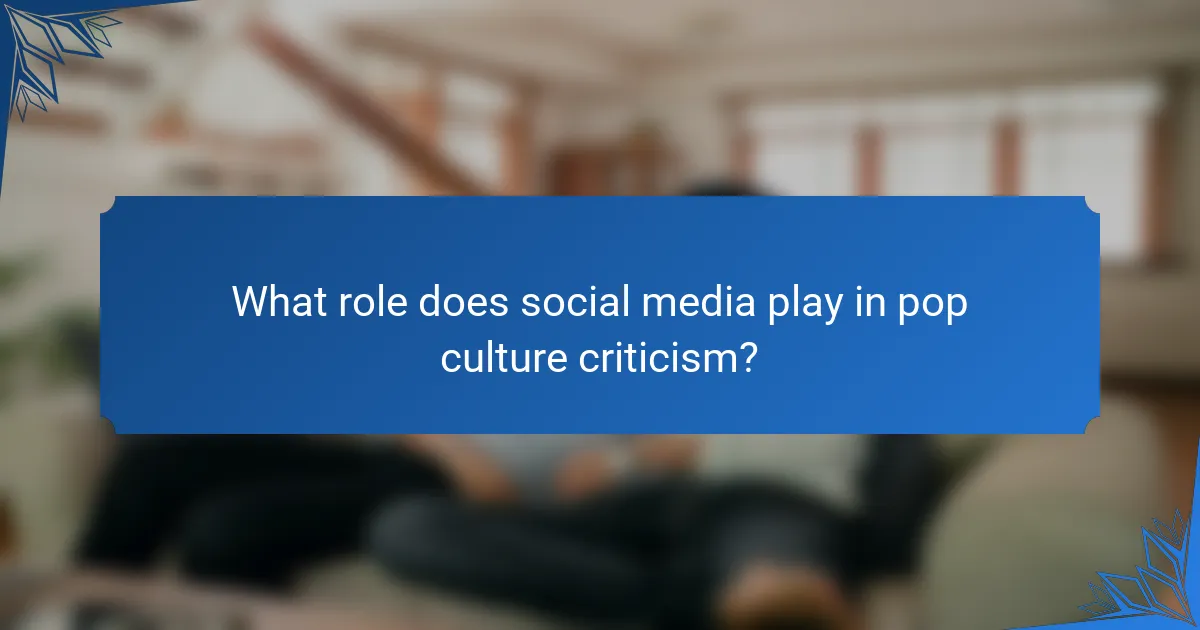
What role does social media play in pop culture criticism?
Social media serves as a powerful platform for pop culture criticism, enabling immediate feedback and widespread dissemination of opinions. It allows critics and audiences alike to engage in discussions, share insights, and challenge mainstream narratives in real-time.
Amplifying diverse voices
Social media significantly amplifies diverse voices in pop culture criticism by providing a platform for underrepresented perspectives. This democratization of criticism allows individuals from various backgrounds to share their experiences and insights, enriching the overall discourse.
Platforms like Twitter, Instagram, and TikTok enable users to post reviews, critiques, and analyses that can reach a global audience. For example, a TikTok creator discussing representation in a popular film can spark conversations that resonate with viewers who may not have been heard in traditional media outlets.
To effectively amplify diverse voices, it is essential to actively seek out and engage with content from creators of different backgrounds. Following a range of critics can provide a more nuanced understanding of pop culture phenomena and help challenge dominant narratives.
